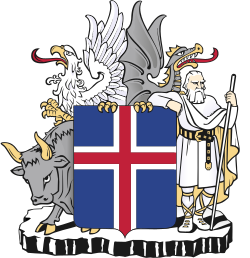| Revision as of 07:52, 29 June 2012 editSsolbergj (talk | contribs)Extended confirmed users, Pending changes reviewers45,587 edits Please respect the discussion on the talk page.← Previous edit | Revision as of 19:26, 29 June 2012 edit undoFry1989 (talk | contribs)Extended confirmed users34,546 edits practice what you preachNext edit → | ||
| Line 64: | Line 64: | ||
| <gallery> | <gallery> | ||
| File:Coat_of_arms_of_the_Icelandic_Commonwealth.svg|The coat of arms of the ] | File:Coat_of_arms_of_the_Icelandic_Commonwealth.svg|The coat of arms of the ] | ||
| File: |
File:Iceland COA 13th century.png|The coat of arms of the Earldom of Iceland from 1262 | ||
| File:Iceland stockfish coa.svg|The coat of arms under Danish rule, ca. 16th – 1903 | File:Iceland stockfish coa.svg|The coat of arms under Danish rule, ca. 16th – 1903 | ||
| File:Coat of Arms of Iceland (1904).svg|The coat of arms of the Home-rule period | File:Coat of Arms of Iceland (1904).svg|The coat of arms of the Home-rule period | ||
Revision as of 19:26, 29 June 2012
| Coat of arms of Iceland Skjaldarmerki Íslands | |
|---|---|
 | |
| Armiger | Iceland |
| Adopted | 1 July 1944 |
| Shield | Azure, a cross gules fimbriated argent |
| Supporters | Landvættir: A bull (Griðungur) and a rock giant (Bergrisi), a griffin (Gammur) and a dragon (Dreki) |
| Compartment | Pahoehoe lava block |
| Coat of arms of the President of Iceland Forsetaskjaldarmerki | |
|---|---|
 | |
| Armiger | President of Iceland |
| Adopted | 1944 |
| Shield | Azure, a cross gules fimbriated argent, charged with a white square with the full achievement of the national coat of arms. |
The coat of arms of Iceland displays a silver-edged, red cross on blue shield (blazoned: Azure, on a cross argent a cross gules.). This alludes to the design of the Icelandic flag. The supporters are the four protectors of Iceland (landvættir) standing on a pahoehoe lava block. The bull (Griðungur) is the protector of southwestern Iceland, the eagle or griffin (Gammur) protects northwestern Iceland, the dragon (Dreki) the northeastern part and the Rock-giant (Bergrisi) is the protector of southeastern Iceland. Great respect was given to these creatures of Iceland, so much that there was a law during the time of the Vikings that no ship should bear grimacing symbols (most often dragonheads on the bow of the ship) when approaching Iceland. This was so the protectors would not be provoked unnecessarily.
The landvættir (“land wights”) also decorate the obverse (front) of the Icelandic króna coins, but animals of the ocean (fish, crabs and dolphins) appear on the reverse (back). The Icelandic presidency uses a swallowtailed Icelandic flag with the coat of arms. The National Commissioner of Icelandic Police uses a white flag with the coat of arms, when the use of the State flag is not warranted, and so may some other state services do as well.
History
Iceland has historically had various distinct coats of arms:
- The first one is believed to have been a shield with six blue stripes and six silver stripes, possibly signifying the 12 þings of the Icelandic Commonwealth.
- The second one is believed to be the one that was given to Earl Gissur Þorvaldsson by the King of Norway, Hákon Hákonarson, during 1258. It was patterned on the King's own coat of arms, exchanging the colors of the shield with the color of the lion and adding the blue and silver stripes of the previous coat of arms.
- Around or after 1500, the Icelandic coat of arms became a crowned stockfish on a red shield. It is known as the Þorskmerkið (“the cod markings”) and the fish was depicted occasionally in a variant form.
- On October 3, 1903, the coat of arms of Iceland was changed to a white falcon on a blue shield. It remained in use until the first version of the coat of arms with the landvættir became official on February 12, 1919, representing the Kingdom of Iceland under Danish rule. This lasted until Iceland declared independence.
- When independence was declared on June 17, 1944, the coat of arms was redesigned; removing the Danish crown and improving upon the earlier design of the landvættir.
-
 The coat of arms of the Icelandic Commonwealth
The coat of arms of the Icelandic Commonwealth
-
 The coat of arms of the Earldom of Iceland from 1262
The coat of arms of the Earldom of Iceland from 1262
-
 The coat of arms under Danish rule, ca. 16th – 1903
The coat of arms under Danish rule, ca. 16th – 1903
-
 The coat of arms of the Home-rule period
The coat of arms of the Home-rule period
-
 The coat of arms of King Christian X of Iceland 1918 to 1944 and Denmark 1903 to 1947. Iceland is represented by the silver falcon in the lower left corner. The falcon was removed from the Danish arms in 1948.
The coat of arms of King Christian X of Iceland 1918 to 1944 and Denmark 1903 to 1947. Iceland is represented by the silver falcon in the lower left corner. The falcon was removed from the Danish arms in 1948.
-
 The coat of arms of the Kingdom of Iceland 1919 to 1944
The coat of arms of the Kingdom of Iceland 1919 to 1944
See also
References
- "History". Icelandic Coat of Arms. Reykjavik: Prime Minister's Office. Retrieved 2009-05-22
- Prime Ministry of Iceland. "Ágrip af sögu skjaldarmerkis Íslands (en. History of Iceland's Coat of Arms)". Prime Ministry of Iceland. Retrieved 2012-01-04.
External links
- The Icelandic Prime Minister's Office on the Coat of Arms
- Official website of the President of Iceland on national heraldry
| Coats of arms of Europe | |
|---|---|
| Sovereign states |
|
| States with limited recognition | |
| Dependencies and other entities | |
| Other entities | |